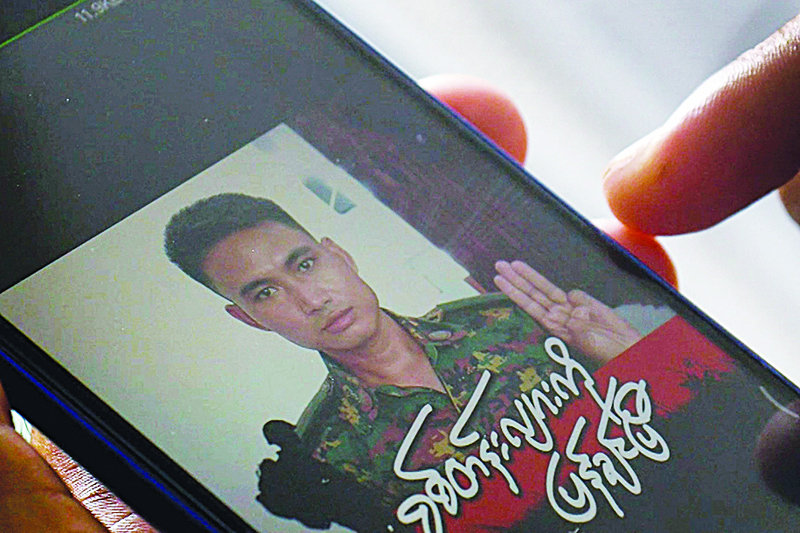 YANGON: This screengrab shows Shing Ling, a former Myanmar soldier who deserted the military to join the democracy movement in the aftermath of the military coup, looking at his Facebook profile showing his picture wearing a military uniform.—AFP
YANGON: This screengrab shows Shing Ling, a former Myanmar soldier who deserted the military to join the democracy movement in the aftermath of the military coup, looking at his Facebook profile showing his picture wearing a military uniform.—AFP
YANGON: Dressed in his army uniform, Shing Ling flashes a three-finger salute for defiant social media posts after deserting Myanmar's military to join the democracy movement. The 30-year-old soldier posted the image on Facebook last week as security forces were staging increasingly lethal crackdowns against protesters. It racked up more than one thousand shares as commenters praised his bravery, before his profile went private. Since the military ousted civilian leader Aung San Suu Kyi from power in a February 1 putsch, more than 180 people have been killed as police and soldiers deployed tear gas, stun grenades, rubber bullets and live rounds during near-daily crackdowns on anti-coup demonstrators.
"I have felt so guilty and ashamed since February 1," Shing Ling told AFP from a hideout in Yangon. Despite feeling "shocked" about Suu Kyi's detention, it was the violence in Yangon's North Okkalapa township in early March that became the catalyst for him to join a nationwide civil disobedience movement. "I was stationed really close to North Okkalapa, so it would be my gun that shoots unarmed people," he said. "I couldn't let that happen. That's why I decided to join." On his public Instagram account, the ethnic Chin soldier has posted photos of himself wearing his military uniform since October 2018.
In his most recent post, he shared the image of him flashing the three-fingered salute after joining a nationwide boycott by civil servants who refuse to work under a junta regime. But while there have been isolated reports of police and soldiers' defection, it remains rare for them to publicly announce a change of allegiance while still in Myanmar, for fear of retaliation. For soldiers, the punishment for desertion is the death penalty, under military law. Nearly 200 police officers and their families have fled the country since the coup-part of a growing stream of defectors crossing into the northeastern Indian state of Mizoram, according to Indian security officials.
'I expect the worst'
An orphan from Chin state in western Myanmar, Shing Ling said he joined the military academy as a teenager to be part of an organization that felt like family. "We were like brothers and we were warm to each other-I was happy there, it felt like home," he said. But disillusionment set in after the previous junta regime loosened its grip on power in 2011, opening Myanmar up to the world and allowing for a communications and internet revolution. The soldier said he learned about politics from Facebook-the most popular social media platform in Myanmar-where discussions widened his perspective on the military's role in society.
During the first democratically contested elections in 2015, Shing Ling voted for Suu Kyi's National League for Democracy (NLD), although he later switched allegiance to a lesser party after it failed to live up to his hopes."The rest of my friends in the military did not dare vote (for the NLD) because they were scared if they did, their senior officers would not like it," he told AFP.
Since announcing his defection from the military on Facebook, the young soldier has cut ties with his battalion, changed his appearance and mobile SIM card, and is now living in a secret location in Yangon, the country's sprawling commercial hub. He says he knows the junta will eventually find him. "I expect the worst," he adds. But the deep sorrow he feels when seeing the crackdowns against unarmed civilians has strengthened his resolve, and he wants all his former comrades to answer the question: "If you have to choose between the military and the country, which will it be?" - AFP




